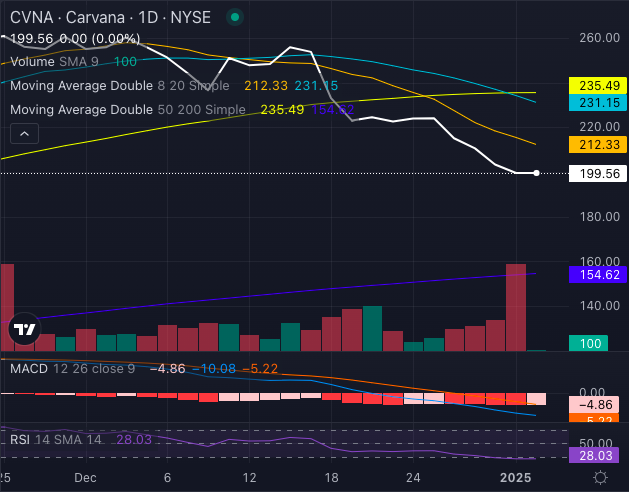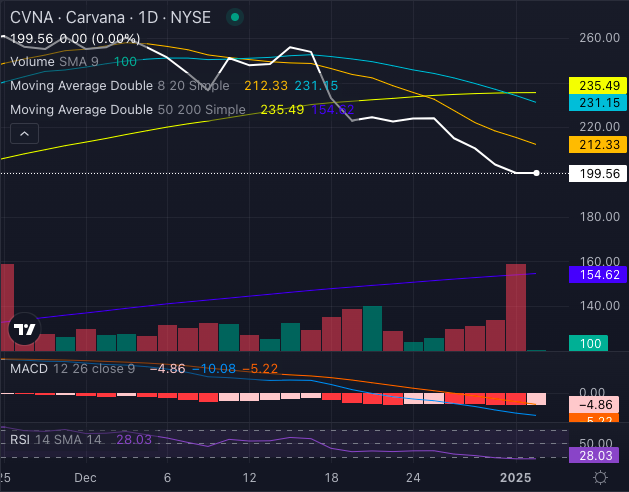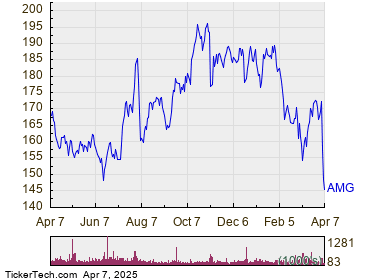Carvana Co. Faces Stormy Seas: Can It Navigate the Dip? CVNA has had a turbulent year, with an astonishing 327% surge overshadowed by a 21.97% decline in just the last month.
Yet, beneath the sensational headlines lies a stock chart that indicates signs of wear.

Chart created using Benzinga Pro
Carvana Stock Indicators Suggest a Downward Trend
Recently, Carvana’s stock has dipped below crucial simple moving averages (SMA) for 8, 20, and 50 days—signs that point to a bearish trend. Key indicators include:
- The current stock price is $199.56, significantly under the eight-day SMA of $212.33, indicating a weak short-term momentum.
- This gap increases with the 20-day SMA at $231.15 and the 50-day SMA at $235.49, adding more pressure on the stock.
- Though the 200-day SMA stands at $154.62, suggesting a favorable long-term outlook, it offers little reassurance for those trading in the short term.
With a moving average convergence divergence (MACD) of -10.08 and a relative strength index (RSI) of 28.03, Carvana’s stock is classified as oversold. However, such a condition doesn’t inherently mean a lower price is a bargain—it may signal further troubling news.
Read Also: Top 2 Tech And Telecom Stocks That Are Ticking Portfolio Bombs
Hindenburg Research Raises Red Flags
Short-seller Hindenburg Research has raised alarms about Carvana, dubbing its recovery a “mirage.” The report provides accusations of “accounting manipulation” and deficient underwriting practices, which come at a precarious time for the company. Notably, Carvana has been trading at inflated valuations:
- Carvana’s forward price-to-earnings (P/E) ratio stands at 101, a remarkable premium compared to competitors such as CarMax Inc KMX and AutoNation Inc AN.
- Sales multiples are an astonishing 845% above those of its peers.
Moreover, Hindenburg claims that Carvana is artificially boosting its valuation by $800 million in loan sales to a “suspected undisclosed related party,” alongside allegations of insider selling to further substantiate its claims of an overheated stock.
In response, Carvana dismissed the report as “misleading and inaccurate,” reaffirming its commitment to its 2025 growth strategy when speaking to Benzinga.
Implications for Investors
Despite the unfavorable report, Carvana’s shares demonstrated some resilience, increasing by over 3% on Thursday after an initial dip. Nevertheless, the pressing question remains: can the stock maintain its recovery, or is this just a temporary bounce?
Given the prevailing selling pressures and a technical landscape that aligns with bearish sentiment, investors should exercise caution. While oversold conditions might attract some bargain hunters, the current negative signals—along with the fundamental worries highlighted by Hindenburg—suggest that Carvana could be facing more headwinds in the near term.
For those holding CVNA, preparing for potential challenges ahead may be wise.
Read Also:
Photo: Shutterstock
Market News and Data brought to you by Benzinga APIs




